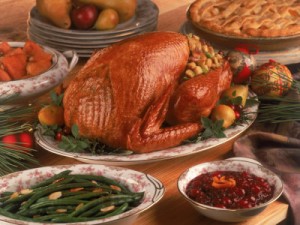 It’s that time of year full of merriment, parties, and lots of special food treats. It’s also the time of year that the majority of Americans gain weight. And some studies have shown the holiday weight gain actually accumulates year after year.
It’s that time of year full of merriment, parties, and lots of special food treats. It’s also the time of year that the majority of Americans gain weight. And some studies have shown the holiday weight gain actually accumulates year after year.
Sure, there are all sorts of theories about how to avoid those few extra pounds over the holidays. But which strategies actually work?
Brian Wansink – a Cornell professor and director of the Cornell Food and Brand Lab – has conducted dozens of studies on environmental cues and diet. He explained there are three main pitfalls to avoid at holiday meals:
- First, studies have shown that those who cook food eat more of it because preparing the food makes them feel as if they deserve it. Take home message: If you’re hosting a holiday gathering, serve yourself a normal portion and then move on to socializing with your guests.
- Research from Wansink’s lab has also shown that 9 percent of all calories consumed on Thanksgiving are eaten before the big meal. You can make a major dent in your holiday calorie consumption just by avoiding high-calorie appetizers. If you must munch, stick with plain vegetables.
- Wansink’s lab has also documented the “happy host” syndrome – essentially when people take more food as a compliment to the host. Research has found that the host won’t actually remember who much food you took in your first plate, only how many times you went back for more. So start with a tiny portion and then go back for a tiny bit more to send the message you’re a fan of the meal.
You can see Wansink discussing his holiday-eating tips in the following video.
Here’s wishing you a happy, healthy holiday!
Note: EBL will be taking a break for the holiday season, but will return with new evidence-based info in the New Year.



This website was… how do I say it? Relevant!!
Finally I have found something that helped me.
Many thanks!
Weight gain, in my opinion, is mostly based on behavior syndromes.
“Happy host” is a very good example.. “I cook = I deserve” also is very good one.
Self awareness is the key… Thanks!